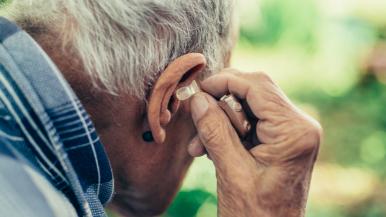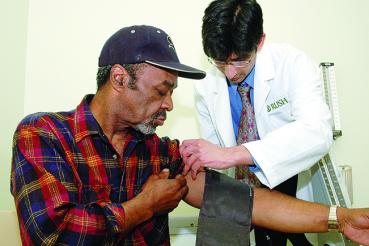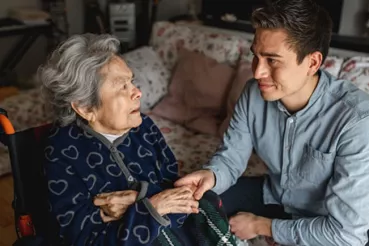Maybe you're wearing reading glasses right now and already know this: None of us see as well as we get older.
"Sight — like all the other senses — gradually fades as a normal part of aging," says Magdalena Bednarczyk, MD, a geriatrician at Rush University Medical Center.
Diseases — especially ones that grow more common with age — can also affect your senses.
Still, there are ways to protect each sense and compensate for any loss you may already have. Here's your guide to the five main senses.
Sight
What to expect over time: As you get older, it's harder to see in dim light. "That's because your pupils naturally shrink with age, so they can't let in as much light,” Bednarczyk explains. In fact, by age 60, your pupils may be only one-third of the size they were when you were 20.
In addition, the lens in your eyes loses elasticity. This makes it harder to focus close up — a blurriness that typically begins in your 40s. (Hence, the need for reading glasses.)
Several vision-robbing conditions also disproportionately affect older adults, including cataracts; glaucoma; and diseases that damage the retina, such as age-related macular degeneration — a leading cause of vision loss in people over age 50.
Take action: Brighter lighting throughout your home — plus bright lamps for tasks like reading — can help boost your vision. You might also install motion lights that turn on when you enter a room, since aging eyes have a harder time adjusting to darkness than younger ones.
Also, ask your doctor how often you need eye exams. "That’s one of the very best things you can do to protect your vision," Bednarczyk says. Regular exams help detect eye diseases early, which is when they may be most treatable.
Smell
What to expect over time: After 50, your sense of smell slowly ebbs as the nerves responsible for smell begin to deteriorate. Your nose also produces less mucus, which means odors don’t always stay in the nose long enough to be detected by nerve endings.
A cold can temporarily diminish smell, and sinus problems or allergies can cause chronic declines in smell. Antibiotics and other medications can also inhibit smell. And loss of smell occasionally signals something serious, such as a tumor in the nasal passages or even early stages of Alzheimer's disease or Parkinson's disease.
Take action: Try to head off colds with frequent handwashing. If you have allergies, try to limit contact with whatever you're allergic to. For example, keep Fluffy or Fido out of your bedroom if you're allergic to animal dander.
For either allergies or chronic sinus problems, talk to your doctor about using an anti-inflammatory medicine to reduce nasal swelling. Also mention any medicines you use. One might be affecting your smell, and there may be an alternative drug you can take.
Most important, if your sense of smell has slipped, make sure your smoke detectors are in good working order. You may be less able to smell smoke.
Be mindful of what you eat if your food tastes bland. Rather than adding salt, which can raise blood pressure, or sugar, which adds calories, perk your food up with herbs and spices.
Taste
What to expect over time: Taste, like smell, also declines after age 50. Your taste buds — which decrease in number and shrink with age — contribute to this loss. So can smoking.
As with smell, taste can temporarily fade because of respiratory infections, like a cold. Some medications can sometimes alter taste too. Your mouth may also produce less saliva as you grow older, which can impair taste.
Take action: "Be mindful of what you eat if your food tastes bland," Bednarczyk says. "Rather than adding salt, which can raise blood pressure, or sugar, which adds calories, perk your food up with herbs and spices."
Are you a smoker? Your sense of taste will improve if you quit.
If you have dry mouth, try sucking on ice chips throughout the day and breathing through your nose instead of your mouth.
Touch
What to expect over time: Often, because of reduced circulation to nerve endings, your sense of touch declines as you age. It may be harder to feel pain, tell differences in temperature or even know where your body is in relation to the floor. Nerve damage from diabetes can add to these challenges — for example, you might not feel your feet when walking.
Take action: If your skin is less sensitive to temperature — for instance, you have a hard time knowing if something is really hot — set your water heater to 125 degrees or lower to avoid potential burns. If you're less aware of pain, check your skin daily for injuries, especially your feet.
To help preserve your sense of touch, exercise regularly to improve blood flow. "And if you have diabetes, it’s crucial to keep your blood sugar in its target range. That reduces your risk of serious nerve damage," Bednarczyk says.
Hearing
What to expect over time: By age 60, one in three adults has some trouble hearing. Two likely causes are long-term exposure to loud noises and normal wear and tear on nerve cells and tiny hairs in the inner ear that allow hearing.
Take action: If you're straining to hear, ask people to face you and speak louder without shouting. Control background noises that make hearing harder. For example, turn off the TV or lower the volume on music. Also wear earplugs to help protect yourself from loud noises, which can further harm hearing.
And while age-related hearing loss often can't be reversed, you don't have to live in a world of muffled sounds.
Most hearing aids today are computer-programmed to match the nuances of each individual's hearing loss and filter out distracting background noises. If hearing aids are no longer helping, a cochlear implant may be an option.
Bottom line: Don't automatically assume that a decline in your senses is just part of growing older, Bednarczyk says. Any sudden or significant change — or one that's accompanied by other symptoms — might be a warning sign of a disease or condition that needs treatment.




